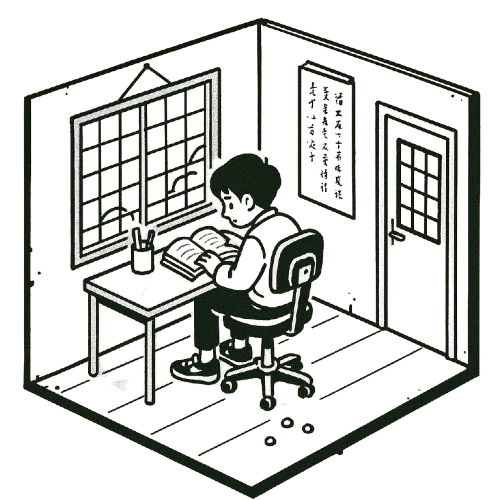
The Chinese Room Unbound

I often come to realizations belatedly: At some point in the past, I might have experienced a moment of epiphany, but later I realize that all I did in that moment was open a door.
In 1990, Stevan Harnad adapted the Chinese Room thought experiment: imagine a newborn learning Chinese as their first language, with their only source of information being a Chinese dictionary. Could they truly learn Chinese under such conditions? Many people believed the answer was no. Language, when severed from concrete life experiences and genuine interactions, becomes a cyclical mapping of symbols, an empty and meaningless loop.
For a long time, this argument was a cornerstone for many computational linguists critiquing language models: they can generate fluent language and even perform tasks with near perfection, but they cannot truly understand language. When I first read this paper, I couldn't help but reflect: if language models cannot achieve true understanding...can I?
Then I began to wonder if my "life" was the same. Through fragments of novels, movies, short tiktok videos, and observations of others, I've tried desperately to distill the essence of life, mimicking what I perceive to be "real life." To others, I seem to be living seamlessly, but deep down, I have never truly felt the authentic face of life. Without direct engagement with the world, without capturing meaning in the minutiae, life becomes nothing more than a dictionary-defined program.
The same goes for "research." In conference poster halls, on arXiv, and through reading blogs like spaces.ac.cn and observing others' work, I've endeavored to follow the "orthodox" research directions, mimicking their storytelling and methodologies. My research might appear orderly and even yield some results, but does it genuinely address real-world problems or resolve questions born of genuine curiosity? If research is merely a combinatorial reassembly of past works, a matter of reverse-engineering the narrative, painting a bullseye around an arrow already lodged in the wall, creating imaginary needs, defining pseudo-problems that fail to stir my curiosity, and exploring no boundaries of my knowledge, then it remains trapped in a "dictionary of academia."
The meaning of language is not born from dictionary definitions but from lived experience. A child learns the word "apple" not by consulting a dictionary but by touching the fruit's smooth, waxy skin, smelling its sweet yet tangy scent, watching its flesh oxidize and darken after a bite, as if it withered and grew old in the span of ten fleeting minutes. Similarly, a thousand people can have a thousand definitions of "love": it can be a touch and yet not a touch; it can be pain, mistakes, collapse, sobbing, and reconciliation; it can be the quiet constancy of two people sharing meals, seasons, and years. The same applies when we attempt to define "life" or "research" with language. Any so-called universal definitions elude us for the same reason.
Breaking out of the Chinese Room doesn't require a more complex dictionary or more precise logic; it requires opening the door. It means grounding every word spoken or written in sensorimotor experiences. It means pulling emotions back from the past, dragging thoughts back from the future, and anchoring them in the present moment. Research, too, must serve real needs or tackle genuine questions of curiosity.
Perhaps we don't need to distill definitions through imitation. What we need is to open the door.